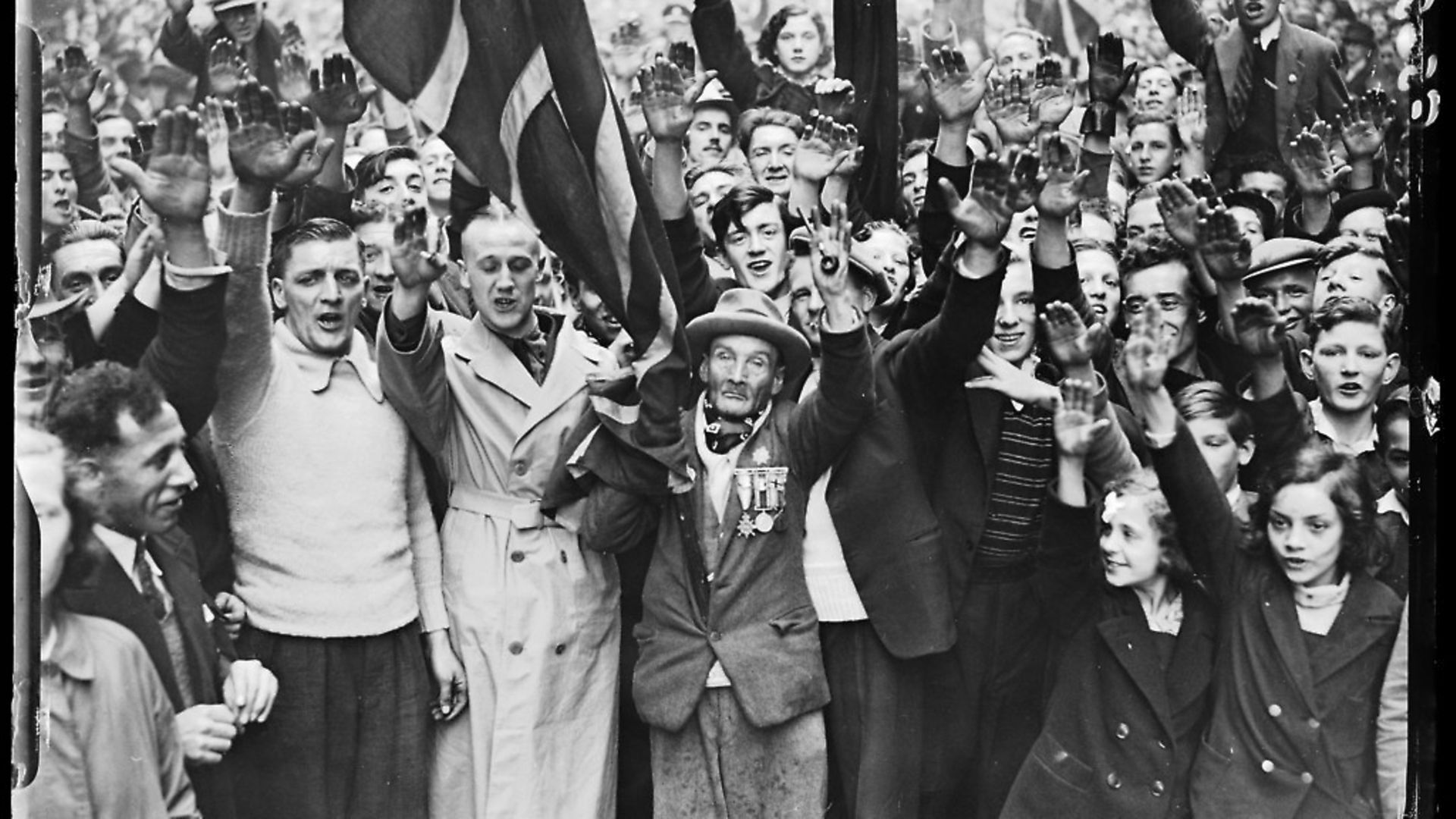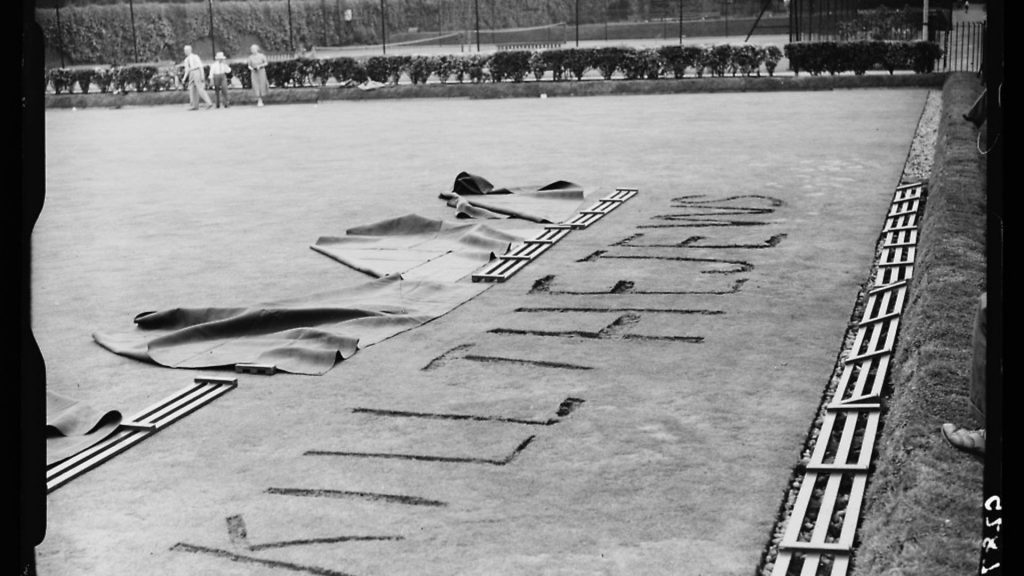
The British might like to think of themselves as immune from Nazism, but Hitler had more sympathisers in the UK than anyone today chooses to remember, says ROBERT HUTTON.

Europeans aren’t like the British. ‘They are quite happy to relinquish their identity and their institutions,’ the economist Roger Bootle told a meeting of the Eurosceptic Bruges Group last month, ‘because in living memory their institutions have failed, and their identity has been bound up with horror and failure and terror. Our [British] history is different, and we are different.’
Part of his observation is unarguable: Britain escaped totalitarian government in the 1940s, and that has given the country a different view of the European Union project. But just because Britain’s history is different, does that really mean that its people are different, too?
It’s not an uncommon view, especially on the right of British politics. You can see it in the allusions to Dunkirk and D-Day that pop up unbidden in discussions of Brexit. Underlying it is a sense that Britain’s victory in the Second World War – and in these conversations it is generally seen as Britain’s victory, not the Soviet Union’s, or America’s – is the result ultimately of national character. While other European countries succumbed to fascism, first as a political and then as a military force, something about the British made them immune to the infection.
That’s why it’s instructive to listen to Nancy Brown.
In 1943, she sat down in a flat in London to tell her friends about a daylight bombing raid she’d been caught up in in Brighton a few days earlier. ‘I’d no sooner sat down in Ward’s to have my coffee when suddenly: ‘Crack! Crack! Crack!’ And everybody dived to the back of the shop because they felt quite sure the bullets were coming in at the windows. And then ‘Boomp!” – she banged the table – ”Boomp! Boomp!’ And the windows blew in and out and the doors blew in and out. And when we came out we could see great columns of smoke coming up.’
Though dramatic, Brown’s experience was commonplace enough. What made her perspective unique was that she thought the attack was the result of her work. Brown, a council worker in her early twenties, believed herself to be a Nazi spy. Some months earlier, she had handed a list of targets in the town to a man she knew as Jack King, on the understanding that he would pass them to Berlin. Now, she assumed she was seeing the fruit of her labours.
‘You remember my telling you about the guns on top of Telephone House?’ she asked King. ‘Well, one large bomb fell two houses to the right, to the north of it, demolishing a block of flats and a Baptist church! Oh it was marvellous, it really was a near miss. One bomb fell in the municipal market, and that made me quite sure it must be because I – from what I said.’ She was laughing. ‘Because do you remember my telling you about the ARP headquarters? Well, you see, there was a very near miss there because the bomb fell on the corner of the municipal market, which is bang next door to the ARP HQ.’
The bombs may have missed Brighton’s best targets, but that didn’t mean they were harmless. ‘A greengrocer had his head blown off, and umpteen casualties through cut glass and things.’ Another bomb had fallen on a school clinic. ‘It killed a clerk there and badly injured two of the girls, and killed one expectant mother and about two children.’
We know what Nancy Brown said that day because the flat she was sitting in was rented and bugged by MI5. ‘Jack King’ was the alias of Eric Roberts, an officer with an astonishing gift for undercover work. His job was to identify British citizens who would be willing to help Germany. MI5 assumed such people existed, but also assumed they would be hard to find. That wasn’t Roberts’ experience.
Brown had given Roberts hand-drawn maps of Brighton, and picked out the places to attack. Now that an attack had happened, was she horrified by the result? Were her friends? Quite the opposite. ‘I looked in vain at the faces of these three women for any signs of contrition,’ Roberts wrote in his report afterwards. ‘Nancy Brown looked a fine, healthy specimen of an Englishwoman, but it was obvious that the deaths of these people meant absolutely nothing to her. She sat there pleased and happy to think that the news she had given me resulted in the deaths and damage of that last raid.’
By the end of the war, Roberts was providing information on more than 500 people who were, to different degrees, actively sympathetic to Nazis. Some, like Brown, were former supporters of Oswald Mosley’s British Union of Fascists, but many weren’t. Among them was one of the country’s most senior diplomats, William Strang, who privately viewed ‘the Bolshevists and the Jews as the two great enemies of all that was decent’. A few, like Brown, were willing to act on their beliefs, communicating information to a man they thought was a German spy, and proposing sabotage and even assassination missions.
The motivations of his recruits weren’t simply ideological. Despite the nostalgia with which commentators and politicians with no memory of the war talk about rationing and the spirit of the Blitz, the contemporary evidence is that people didn’t in fact enjoy either food shortages or having high explosive dropped on their houses. Neither did everyone pull together. Looting was widespread during the bombing, and in the realm of more civilised crime there was a booming trade in faked or stolen ration books.
The British people never voted for the war. Indeed, Neville Chamberlain’s appeasement at Munich saw him cheered by crowds as he stood with the King on the balcony of Buckingham Palace. Conservative MPs today preparing to fight Brussels on the beaches and the landing grounds would do well to remember that the nation thanked Churchill for leading them to victory by turfing him out at the next election.
MI5 was so horrified by what Roberts had uncovered, and the ease with which he had uncovered it, that a decision was made to suppress his findings. The operation was left out of the reports sent to Winston Churchill, and was barely alluded to even in MI5’s top secret internal history. When other wartime glories of British intelligence, from Bletchley Park to Double Cross, were laid before the public, Roberts’ work was forgotten. None of those he had identified were prosecuted, or even told that they had been the victims of a sting. Strang went on to run the Foreign Office, and then sit in the House of Lords.
It’s hardly surprising that, at the end of the most destructive war in history, MI5 judged there was little public appetite for the idea that many British people had wanted the other side to win. Even during the war, in the propaganda films which warned that German spies were everywhere, there had been a certain reluctance to suggest that these agents might be salt-of-the-earth Brits acting of their own free will, rather than Nazis with faked documents and perfect English.
But if it’s understandable, that reluctance to confront the truth has allowed comforting myths to grow. Take the Tory MEP Daniel Hannan’s assertion that ‘what made 1930s Britain unusual in Europe is how weak fascism was here’. Martin Pugh, author of the history Hurrah for the Blackshirts!, argues that this view, though commonplace, is mistaken.
At its height, the British Union of Fascists had 40,000 members and the support of more than one newspaper. It’s true that they never won a seat in parliament, but Mosley’s plan wasn’t to seek power by conventional means – the party didn’t even stand candidates in the 1935 election. He expected to be invited into government at a moment of crisis, as had happened to Hitler and Mussolini. To this end, he courted right-wing politicians who were sympathetic to his outlook. There was a free exchange of ideas and people between fascist groups and the Conservative Party. For the first months of the war, it still seemed to Mosley that his moment might come, and that military setbacks and the quest for a negotiated peace – a quest that was led by the prime minister, Neville Chamberlain, and that enjoyed popular support – might propel him to power.
And though Mosley’s party never won a seat, it didn’t mean there weren’t fascists in parliament.
The only MP to be interned during the war, Archibald Maule Ramsay, was a member of the Scottish Unionists – the English Conservatives’ sister party. He marked the outbreak of war by sitting in the House of Commons library writing a parody song: Land of Dope and Jewry.
If fascists were enthusiastic about Hitler, others were naive. At the opposite end of Scotland’s politics from Ramsay was Arthur Donaldson, a future leader of the Scottish National Party. Focused on his own cause, he argued in 1942 that German victory over Britain would leave Scotland in a better position than it had enjoyed before the war, a view of Nazi occupation of which the most charitable interpretation is that he paid staggeringly little attention to what was going on in the world around him.
The question isn’t theoretical. The experience of the Channel Islands, occupied throughout the war, shows us that having English as a first language doesn’t inoculate people against the moral compromises of collaboration, or prevent authorities from rounding up Jews.
In London too there was a willingness to come to an accommodation with dictators. Lord Halifax, who might have become prime minister instead of Churchill, wanted to explore peace with Germany in 1940.
Churchill in his turn was perfectly capable of moral flexibility. When in 1943 Germany announced it had found the corpses of thousands of Polish prisoners of war in a forest in Katyn, murdered by the Soviet Union, London pretended to believe Stalin’s denials. Britain might have gone to war to protect Poland, but the USSR was the more important ally now.
‘If Auschwitz had been in Hampshire,’ the playwright Edward Bond wrote, ‘there would have been Englishmen to guard it.’ Reading the transcripts of the conversations that Nancy Brown and her friends had with Eric Roberts, when they discuss their loathing of Jews, and which of their acquaintances they would like to see killed, there can be little doubt that they would have been willing volunteers. Britain’s history may be different from Germany’s, but it does not follow that we are different.
Robert Hutton is the author of Agent Jack: The True Story of MI5’s Secret Nazi Hunter









